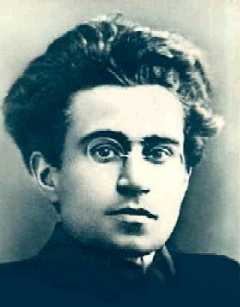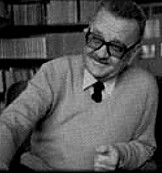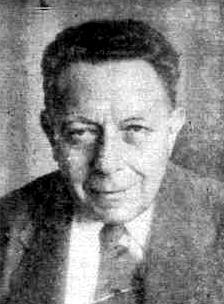Gr
Gramsci, Antonio (1891-1937)
 In 1921 a founder of Italian Communist Party. Wrote extensively while in prison under Mussolini from 1926 until his death. "... losing his way in familiar streets, taking the wrong train, indifferent to the comfort of his lodgings..; but intectually, he was absolutely alive. Trained intuitively in the dialectic, quick to uncover falsehood and transfix it with the sting of irony, he viewed the world with exceptional clarity". (Serge)
In 1921 a founder of Italian Communist Party. Wrote extensively while in prison under Mussolini from 1926 until his death. "... losing his way in familiar streets, taking the wrong train, indifferent to the comfort of his lodgings..; but intectually, he was absolutely alive. Trained intuitively in the dialectic, quick to uncover falsehood and transfix it with the sting of irony, he viewed the world with exceptional clarity". (Serge)
Gramsci is renowned for his development of the idea of Hegemony and the need for the proletariat to establish “intellectual and moral leadership” of the masses, for criticising overly deterministic conceptions of historical development which predominated in the Marxist movement up till 1917, for emphasising the role of the party in formation of a class, rather than simply representing a class, likening the role of a political party to that of Machiavelli's Prince, and thus for emphasising the ideological aspects of political struggle.
See Antonio Gramsci Archive, and An Introduction to Gramsci's Life and Thought by Frank Rosengarten
Grey, Edward (Lord Grey) (1862-1933)
Aristocratic politician who entered the British parliament as a Liberal MP in 1885; Foreign Secretary 1905-16. His most important activities included the formation of an alliance with Tsarist Russia in 1907 and with Italy in 1915. Participated in the peace talks of May 1913 that ended the war between Turkey and the Balkan states. Made a secret agreement - to assist France in event of attack - which he implemented in August 1914, bringing Britain into the war. Chancellor of Oxford University 1928-33.
Grlić, Danko (1923 – 1984)
 Philosophy professor at the University of Zagreb, and a member of the Praxis group. Grlić represented critical Marxist positions typical for the whole Praxis school. After Marx, Grlić’s favourite author was Friedrich Nietzsche. He wanted to overcome the negative image of Nietzsche in Marxist circles, claiming that the Nazis had misrepresented Nietzsche’s thought.
Philosophy professor at the University of Zagreb, and a member of the Praxis group. Grlić represented critical Marxist positions typical for the whole Praxis school. After Marx, Grlić’s favourite author was Friedrich Nietzsche. He wanted to overcome the negative image of Nietzsche in Marxist circles, claiming that the Nazis had misrepresented Nietzsche’s thought.
Grlić’s main field of scientific interest was aesthetics. He is author of a four-volume study of aesthetics, published over the period 1974-1979. Grlić’s other works include: Dictionary of Philosophers (1968), Contra Dogmaticos (1971), Friedrich Nietzsche (1981) and The Challenge of the Negative: to the aesthetics of Theodor Adorno (1986, posthumous).
Zdravko Saveski
Grothe, Hermann (1888-1961)
Metalworker. In SPD (Sozialistische Partei Deutschlands, Social-Democratic Party) in 1907. Conscripted in 1914, hospitalised during 1916–17, discharged. Member of revolutionary shop-stewards in Marienfelde, entrusted amongst others with task of preparing November insurrection. Active amongst unemployed in 1919. From 1922, president of national council of workers’ councils. KPD (Kommunistischen Partei Deutschlands/German Communist Party) full-timer during 1924–33; jailed under Hitler for two-and-a-half years, lived in East Berlin.
Grossman, Henryk (1881-1950)
 For a time a member of the Frankfurt Institute; a Marxist economist, who developed Marx’s theory of the falling rate of profit as a theory of the crisis of capitalism in The Law of Accumulation and Breakdown of the Capitalist System (1929).
For a time a member of the Frankfurt Institute; a Marxist economist, who developed Marx’s theory of the falling rate of profit as a theory of the crisis of capitalism in The Law of Accumulation and Breakdown of the Capitalist System (1929).
Grossman joined the socialist movement in Krakow while still at school. At university he turned to organising the Yiddish-speaking Jewish working class. He played a prominent role in setting up the Jewish Social Democratic Party (JSDP) on May Day 1905 when it split from the Polish Social Democratic Party (PPSD).
Although he ceased to be an active member of the JSDP’s leadership in 1908 when he moved to Vienna, he became a member of the Polish Communist Party in Warsaw in 1920.
The following year Grossman left the Polish Central Statistical Office where he was in charge of running independent Poland’s first population census, refusing to go along with reactionary efforts to manipulate the census. He then became a professor at the Free University of Poland where he continued to work on Polish economic history and published several Marxist studies in the history of economic thought. At the same time Grossman was one of the main organisers of the People’s University. In addition to general educational and cultural activities the People’s University provided a key forum for open political discussion. Grossman was arrested five times and spent periods ranging up to eight months in prison. Eventually, after a public campaign freed Grossman, he was forced into exile in November 1925.
Grossman then joined his old mentor in Vienna, Carl Grünberg, at the Institute for Social Research (The Frankfurt Institute). He did not join the German Communist Party but was politically close to it. In his preface to The Law of Accumulation Grossman wrote, “While Marxists have written extensively on the political revolution, they have neglected to deal theoretically with the economic aspect of the question and have failed to appreciate the true content of Marx’s theory of breakdown. My sole concern here is to fill this gap in the Marxist tradition.”
The Comintern wrongly interpreted Grossman’s book as suggesting the automatic breakdown of capitalism, and condemned The Law of Accumulation. When the Institute was closed down, Grossmann fled to Paris where he published a study of the origins of the modern scientific worldview, arguing that the technological advances associated with early capitalism provided the foundations for mechanistic scientific theory.
He also reassessed the sectarian Communist strategy which had prevented a united working class fight against the Nazis in Germany. For a period he was sympathetic to Trotsky’s explanation of the ‘German catastrophe’ and the degeneration of the Russian Revolution. But he swung back to a Stalinist position as the Comintern adopted its ‘popular front’ strategy after Hitler’s triumph in Germany.
Grossman then moved to London before rejoining the rest of the Institute in New York in 1937. Grossman had moved politically back to Stalinism, and was out of step with the growing pessimism of others at the Institute. In 1949 he left to take up a chair in political economy at the University of Leipzig in the Soviet zone of Germany. He joined the Socialist Unity (Communist Party) and identified with the regime. But he continued to stand by his contributions to economic theory, although they were heretical, and he prepared a collection of his essays from the late 1920s and early 1930s. After he died nothing was done to publish it.
Grossman’s essays, The Law of Accumulation and his study of dynamics were eventually reissued in the 1960s and early 1970s. Note that the final chapter of the original German Law of Accumulation is missing from the 1992 English translation by Jairus Banaji.
Grün, Karl (1813-87)
Writer. From 1842 onwards Editor of the newspaper, Mannheimer Abendzeitung. After 1844 one of the chief representatives of "true socialism".
Grylewicz, Anton (1885–1971) .
Son of worker, mechanic. In SPD (Sozialistische Partei Deutschlands, Social-Democratic Party) in 1912. Two years on Eastern Front, wounded and discharged. Toolmaker in Berlin factory, joined USPD and revolutionary delegates. Assistant to Eichhorn at police headquarters, played important role in January 1919. Deputy-Chairman and then Chairman of USPD in Greater Berlin in 1920, leader of USPD Left. Secretary of Berlin-Brandenburg organisation in 1921. Took part in 1923 in Moscow in preparing plans for insurrection. Leader of KPD (Kommunistischen Partei Deutschlands/German Communist Party) Left, member of Zentrale in 1924, several times sentenced. Expelled from Party in 1927. Became leader of Trotskyists in Germany. Published Trotsky’s writings in Germany. In 1933 arrested in Prague in connection with frame-up aimed at implicating him in espionage. Cleared, reached France in 1937 and Cuba in 1941, where he worked as cabinet-maker until 1955. Retired to West Berlin.